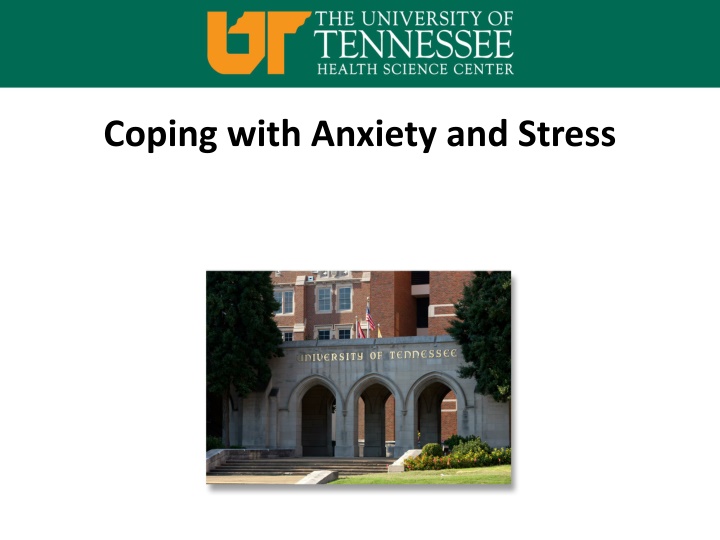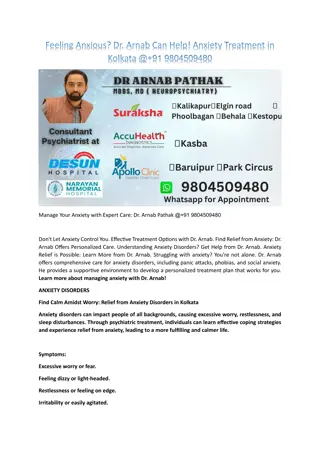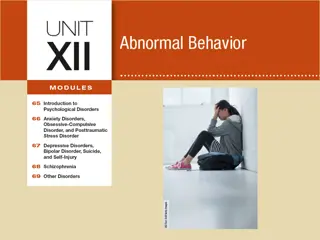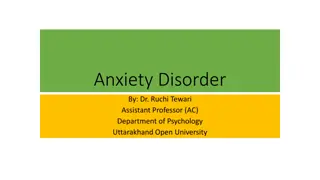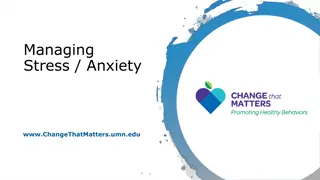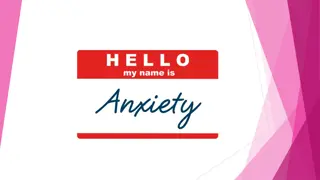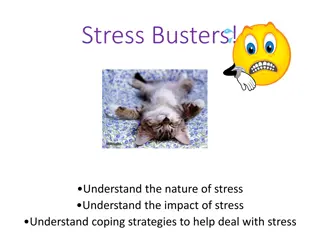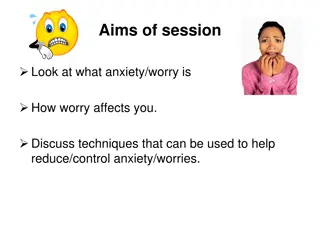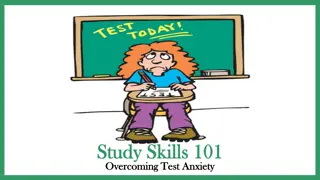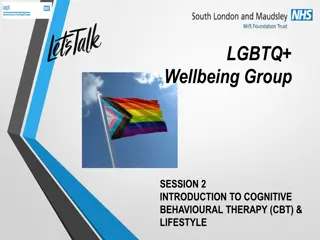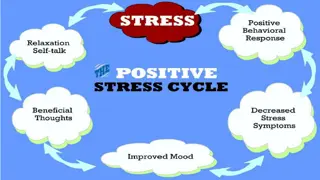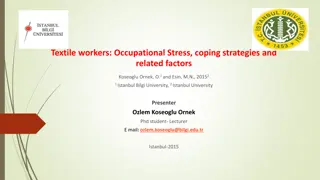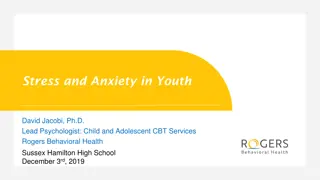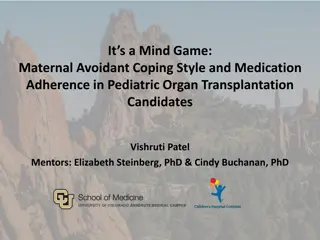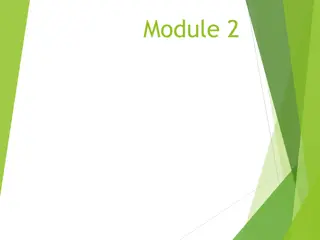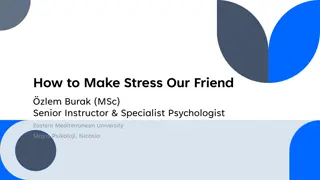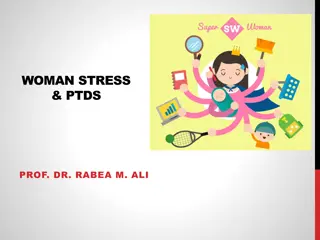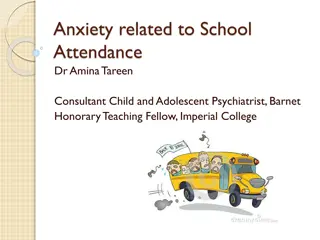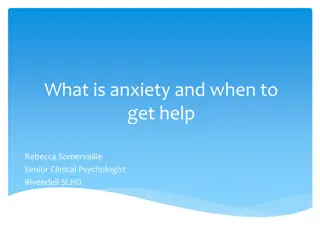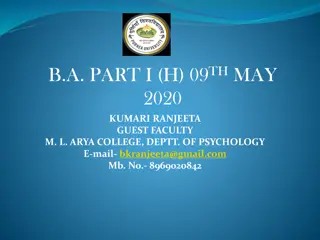Effective Strategies for Coping with Stress and Anxiety
Understanding stress and anxiety is crucial for managing them effectively. Stress is a short-term response to triggers, while anxiety is a sustained mental issue. Symptoms vary but can include headaches, muscle tension, worry, and restlessness. Coping mechanisms like deep breathing, mindfulness, journaling, and engaging in creative activities can help alleviate stress and anxiety.
Download Presentation

Please find below an Image/Link to download the presentation.
The content on the website is provided AS IS for your information and personal use only. It may not be sold, licensed, or shared on other websites without obtaining consent from the author.If you encounter any issues during the download, it is possible that the publisher has removed the file from their server.
You are allowed to download the files provided on this website for personal or commercial use, subject to the condition that they are used lawfully. All files are the property of their respective owners.
The content on the website is provided AS IS for your information and personal use only. It may not be sold, licensed, or shared on other websites without obtaining consent from the author.
E N D
Presentation Transcript
Student Academic Support Services and Inclusion Welcome Student Academic Support Services and Inclusion (SASSI) Educational Coaching and Consultation Disability Appointments Tutoring Sessions Learning Resources for Students Faculty Resources Counseling Sessions Inclusion
What is Stress? Stress is your body s reaction to a trigger and is generally a short-term experience. Positive or negative Response to a threat (fight or flight)
Symptoms of Stress Frequent headaches Sleep disturbance Back or neck pain Lightheadedness, faintness, dizziness Sweaty palms or feet Difficulty swallowing Rapid heartrate Muscle tension Feeling overwhelmed Difficulty quieting the mind Poor concentration Forgetfulness Low energy Loss of sexual desire
Coping with Stress Know how you stress Different people have different triggers Each person copes differently Engage in deep breathing Practice when calm Use when under pressure Inhale, hold, and exhale on a count of four Practice mindfulness Apps are available on the SASSI website Brief walks outdoors with focus on your surroundings
Coping with Stress Keep a journal Write down your best and worst experiences each day Sort through obstacles Figure out what works Get creative Relax your mind Adult coloring books, drawing, poetry, cooking, etc.
What is Anxiety? Anxiety is a sustained mental hygiene issue that can be trigger by stress. Anxiety doesn t fade away once the threat is in the past. Anxiety can cause significant impairment in social, occupational and areas of living.
Symptoms of Anxiety Difficulty controlling worry Restlessness or feeling keyed up or on edge Easily fatigued Difficulty concentrating Irritability Muscle tension Sleep disturbance Exaggerated startle response Headaches, stomachaces, dizziness, pins and needles Shortness of breath, rapid heartbeat, excessive sweating, chest pain
Key differences Although many symptoms are similar, stress is typically transient while anxiety is of longer duration. Anxiety causes clinically significant distress or impairment in social, occupational, or other areas of functioning. Anxiety is among the most common mental hygiene issues in the U.S., affecting over 40 million adults.
Coping with Anxiety Life style changes Daily Exercise Good Sleep Hygeine Health Eating Avoiding Caffeine and alcohol
Coping with Anxiety Counseling is often helpful in helping people identify triggers and develop coping skills Medication is also a common treatment for anxiety. Many people benefit from a combination of the two.
Student Academic Support Services and Inclusion Mental hygiene and well being Common issues among college students Anxiety Disorders Social Phobia Panic Disorder Post-traumatic Stress Generalized Anxiety (Source: Academic Psychiatry) Increased attention to mental health and well being of students @ UTHSC Provide counseling services, Link to existing mental health services, Provide appropriate referrals, Reduce stigma, Educate about key issues including self-care, and Use a preventative focus.
Student Academic Support Services and Inclusion Why now? It s more than just stress Previous instances of depression can increase the risk for depression in medical school Research has demonstrated a number of vulnerabilities for mental health concerns among medical professionals Self- criticism Refusal to seek help Pessimism Feelings of inferiority Self-doubt Passivity (Source: http://in-training.org/wounded-healer)
Student Academic Support Services and Inclusion Why now? Health Sciences students are at increased risk Graduate students in general (about 60%) report feeling overwhelmed, exhausted, hopeless, said, or depressed nearly all the time and one in 10 reported thinking of suicide during the past year. Medical students have rates of depression 15-30% higher than the general population and suicide is the second most common form of death. Dentalstudents psychological distress increases from 36% in first year to 44% in fifth year. Pharmacystudents have well being significantly poorer than the age-adjusted U.S. population. Nursingstudents ( 38.7% of undergraduates) report mild to severe depression. Under-represented minority students in medical fields experience many barriers including racial discrimination, financial and academic stress, and isolation; An estimated 5-10% of Black males have depression. (Source: Medscape.com)
Student Academic Support Services and Inclusion Mind Shift The wounded healer Vulnerabilities can be powerful. Serve as motivators. Better equipped to care for others. Increased empathy. Enhanced quality of patient interactions. More likely to attend to mental health concerns such as suicidal ideation among patients. (Source: http://in-training.org/wounded-healer)
Barriers to accessing counseling Student Barriers Even when counseling services are provided, not all students take advantage of them. Lack of time Lack of confidentiality Stigma Cost Concern about academic record (Source: http://in-training.org/wounded-healer)
You can help Meaningful change is not easy. Requires a cultural shift. 56% of depressed students fear losing respect, and 83% fear that faculty would view them as unfit. Approach each other with empathy and understanding. Refer concerns to SASSI and other campus resources.
Contact information Student Academic Support Services and Inclusion 8 S. Dunlap GEB, Rm BB9 Memphis, TN 38163 Phone: (901) 448-5056 Fax: (901) 448-1451 Email: sassi@uthsc.edu uthsc.edu/sassi
